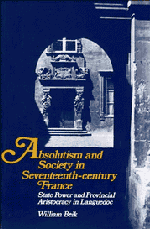 Absolutism and Society in Seventeenth-Century France
Absolutism and Society in Seventeenth-Century France Published online by Cambridge University Press: 05 July 2011
The problem of authority is one of the most fascinating aspects of seventeenth-century political society. Authority, which we may define as the respect attached to a person (or institution) which enabled his directives to prevail, was based more on intangible qualities of prestige than on physical means of coercion. Public officials relied on their delegated royal authority which gave them the right to act officially and lent weight to their actions, but unless they also had the intangible crédit based on custom and public approbation, they would not be very successful in making others take notice. For this reason, acts of authority have to be read both as official steps aimed at a certain practical result and at the same time as ritual defenses designed to maintain a certain public image. Quarrels could arise over seemingly petty points of competence or precedence because they had hidden implications for the participants' honor or prestige. By contrast, violent acts were often accepted complacently because they did not have such implications.
THE NATURE OF AUTHORITY
The rulers of Languedoc had at their disposal a slim arsenal of coercive weapons, most of which were subtly indirect. In this society things as they stood (or as they were imagined to stand since many of them were actually changing) had a tremendous force of inertia, and it was easier to make specific exceptions than to modify general rules. The basic tools of governmental action were judicial processes.
To save this book to your Kindle, first ensure [email protected] is added to your Approved Personal Document E-mail List under your Personal Document Settings on the Manage Your Content and Devices page of your Amazon account. Then enter the ‘name’ part of your Kindle email address below. Find out more about saving to your Kindle.
Note you can select to save to either the @free.kindle.com or @kindle.com variations. ‘@free.kindle.com’ emails are free but can only be saved to your device when it is connected to wi-fi. ‘@kindle.com’ emails can be delivered even when you are not connected to wi-fi, but note that service fees apply.
Find out more about the Kindle Personal Document Service.
To save content items to your account, please confirm that you agree to abide by our usage policies. If this is the first time you use this feature, you will be asked to authorise Cambridge Core to connect with your account. Find out more about saving content to Dropbox.
To save content items to your account, please confirm that you agree to abide by our usage policies. If this is the first time you use this feature, you will be asked to authorise Cambridge Core to connect with your account. Find out more about saving content to Google Drive.